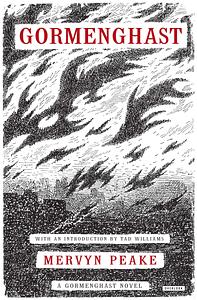You need to sign in or sign up before continuing.
Take a photo of a barcode or cover
My initial thought is that Tim Burton should've made a movie out of this. A quick check of IMDB turns up this production instead, which looks brilliant: http://www.imdb.com/title/tt0197154/
Gormenghast isn't so much horror--although if you mediate for a few minutes on the lives these people are trapped in you'll find plenty of that--as it is a grotesque, the literary equivalent of an old-style circus freak-show, which it's characters all pushed to the far extremes of caricature. Peake manages for all of that to make them human, although I found none sympathetic.
This book really wasn't my cup of tea, but that's not it's fault: if you enjoy rich, often funny, grotesque historical fiction, it's worth a look. And I can't really compare it to anything because it really isn't like anything. It's original. The love-child of Lovecraft, Dickens and Poe is probably the closest comparison. I get the impression Peake has been an influence on Pratchett: Stearpike or Flay or Swelter would be well at home in Anhk Morpork, but Pratchett doesn't quite have the cruel streak required for Gormenghast, and that's just fine by me.
Despite Peake's marvelously fluid writing I need to voice some complaints I have about the second installment compared to the first. In Gormenghast, the story focuses on the growth of Titus, the young earl. Titus's yearning for freedom and departure from childhood is accentuated repeatedly. However I find the way Peake's tendency to condense the significance of a period into one to two grand events, very wanting when it comes to buttressing these focal transitions which are supposed to rouse in the readers' mind appreciation for their gravity. Titus's childhood, which is in all sincerity relatively carefree if somewhat solitary, left only vague impression on me. His confinement and rebellious intention and hatred towards Steerpike, which is rendered starkly with poetic prose, was so dangerously close to banality that I felt guilt when I perceived my own impatience when reading. The story felt like a gelatinous and spectral matrix which encased Titus that might fade away at any moment, and that Titus might be a now sullen, now desperate urchin running in a vacuum, and this could be an elegant and desirous effect, only it was not for me. The extraction of my favorite characters from the story also did not help. Sepulchrave, Cora, Clarice, I miss when they were an active part of the story. The introduction of The Thing was as sudden as the removal, and it was difficult for me to care for her despite being infinitely curious about her, and I was greatly taken aback when she died. I wish she had been more than a plot device. The subversive and rebellious path Titus embarked upon at the end of the story did not move me sufficiently, for unfortunately to me it lacked nuisance and specificity. Fuchsia's death and The Thing's left a bad taste in my mouth which could take some time for me to forget. Perhaps I will continue reading the third book after some months, but for now I will take a pause on the series.
It starts off a bit slow, but oh boy. After that... What I can say. Anyone can die would be an understatement.
Peake is worse then GRRM.
Again, terrific characterisation and worldbuilding.
Peake is worse then GRRM.
Again, terrific characterisation and worldbuilding.
Vier sterren omdat dit toch wel een uniek fantasy-boek is. Ik heb nog niet veel fantasy gelezen, maar ik veronderstel dat een auteur meestal maar de moeite gaat doen om een andere wereld te creëren om er een spannend verhaal in te laten plaatsvinden.
Niets daarvan in deze Gormenghast-reeks: Mervyn Peake creëert een fantasywereld om uiteindelijk gewoon zijn bizarre personages wat met elkaar te laten converseren. Geen magie, geen vreemde wezens. Enkel een duistere sfeer en absurde (soms humoristische) situaties.
Dit boek heeft veel te weinig plot voor zijn groot aantal pagina's, maar die pagina's zijn zo ontzettend goed geschreven, dat je er eigenlijk niets op tegen kan hebben.
Voor mensen die voldoende tijd hebben en geen probleem met sappige beschrijvingen, kan ik overigens het audiobook aanraden (mijn versie: door Saul Reichlin). Sommige boeken zijn gemaakt om voorgelezen te worden, en dit boek is er zo een.
Niets daarvan in deze Gormenghast-reeks: Mervyn Peake creëert een fantasywereld om uiteindelijk gewoon zijn bizarre personages wat met elkaar te laten converseren. Geen magie, geen vreemde wezens. Enkel een duistere sfeer en absurde (soms humoristische) situaties.
Dit boek heeft veel te weinig plot voor zijn groot aantal pagina's, maar die pagina's zijn zo ontzettend goed geschreven, dat je er eigenlijk niets op tegen kan hebben.
Voor mensen die voldoende tijd hebben en geen probleem met sappige beschrijvingen, kan ik overigens het audiobook aanraden (mijn versie: door Saul Reichlin). Sommige boeken zijn gemaakt om voorgelezen te worden, en dit boek is er zo een.
The best world-building I have ever seen. And three of the set pieces in this second volume were so suspenseful that they literally kept me awake entire nights. Truly extraordinary stuff.
challenging
dark
slow-paced
Plot or Character Driven:
A mix
Strong character development:
Complicated
Loveable characters:
No
challenging
dark
tense
slow-paced
Gormenghast, the second book of the trilogy of the same name, is even better than the first!
Titus Groan is no longer a baby, but a young child. He can explore and discover his world of Gormenghast, and take us with him. We can see how the events of the first book affect him. He grows, from a child of about seven years old, to a young man of seventeen. Titus is growing up, and like most, trying to find his place in the world, despite the mold of Earl of Gormenghast he is expected to fill.
Steerpike, the conniving kitchen boy from the first book, becomes an even more manipulative and evil character than in the first book.
The vagueries of the first novel are made a bit clearer; the characters aren't walking through as much of a fog as they were in Titus Groan - they've grown in awareness. There is a darker, more suspenseful atmosphere in Gormenghast. It's a bit more gothic. I couldn't put the book down, wondering what Steerpike was doing next, and of when he'd get caught.
The various characters begin to suspect Steerpike is up to no good, but have no proof to back it up. And they still are under the thumb of the archaic ceremonies of the castle, which leads them to a somewhat listless and useless life.
It isn't all gloom and doom, nor is it boring. Many of the characters are humorous, such as the doctor's sister, pining for a husband, in a bit of a satire of overwrought, soapy romance novels.
Of course, there are Mervyn Peake's beautiful descriptions; like paintings made of words, capturing a mood or a moment in time and holding us in it, or a vignette of a stark but beautiful landscape.
Titus Groan is no longer a baby, but a young child. He can explore and discover his world of Gormenghast, and take us with him. We can see how the events of the first book affect him. He grows, from a child of about seven years old, to a young man of seventeen. Titus is growing up, and like most, trying to find his place in the world, despite the mold of Earl of Gormenghast he is expected to fill.
Steerpike, the conniving kitchen boy from the first book, becomes an even more manipulative and evil character than in the first book.
The vagueries of the first novel are made a bit clearer; the characters aren't walking through as much of a fog as they were in Titus Groan - they've grown in awareness. There is a darker, more suspenseful atmosphere in Gormenghast. It's a bit more gothic. I couldn't put the book down, wondering what Steerpike was doing next, and of when he'd get caught.
The various characters begin to suspect Steerpike is up to no good, but have no proof to back it up. And they still are under the thumb of the archaic ceremonies of the castle, which leads them to a somewhat listless and useless life.
It isn't all gloom and doom, nor is it boring. Many of the characters are humorous, such as the doctor's sister, pining for a husband, in a bit of a satire of overwrought, soapy romance novels.
Of course, there are Mervyn Peake's beautiful descriptions; like paintings made of words, capturing a mood or a moment in time and holding us in it, or a vignette of a stark but beautiful landscape.
Descriptive, vivid prose wraps the cast of characters in Gormenghast. Just as strange, moving, and melodramatic (in the best possible way) as the first.
Reading this book is sort of like watching someone paint for hours and hours and hours. It's really boring but when it all comes together you're like, ah okay.






